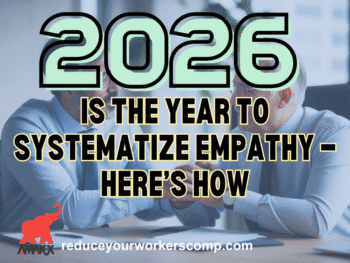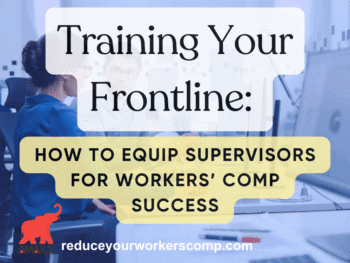There is no way to be thorough enough, in any scenario, when it comes to investigating workers comp claims.This is because only the employee knows for real the who, what, where, when, why, and how the injury occurred, as well as if it occurred in the course and scope of their daily job duties. As an employer, or adjuster, there are a billion questions to ask, but only the employee knows for sure if 100% open and honest communications is taking place with all parties about the extent of the injury and the exact details of the personal and medical background.
But there are ways to ascertain the relevant information to the claim. The adjuster, employer, and doctor all have to work together to figure out the correlation and causal relation of an injury. If one of the parties does not have all of the information that the others have, it creates a rift that can change the course of the claim. Below we discuss ways to be creative in handling the investigation claims. .[WCx]
-
Be the eyes and ears of the workplace
There has classically been a separation between the blue-collar workforce and white-collar management within a business operation. Sometimes this relationship is further apart than others, but in any scenario it helps to keep eyes and ears open at all times.
For example, and for whatever reason, there are those that will talk about being hurt and how they are working through the pain in order to be a great employee and an asset to the company. Whether work related or not, workers chat with each other about injuries. As an employer, in this scenario, nothing will help out more than documentation. This does not necessarily have to come directly from the employee, but try to listen to the gossip that is floating around and possibly apply it later on. If a worker casually talks about arms hurting from golfing so much over the weekend, and later this worker sustains an injury to the arm 6-8 months down the road, it will be hard to remember what that person said and when.
Every employer has personnel files in the HR department for every employee. This is a good place to write down what was overheard on a piece of paper and date it, just in case it is needed down the road. The adjuster will ask for the information about the employee, and if it is known this person is an avid golfer, it helps the adjuster build a profile on this claimant. And it may lead to some surveillance or an IME down the road that can change the direction of the claim. Keep eyes and ears open to listen to what is going on, whether formally or informally. Monday mornings and Friday afternoons are perfect times that workers are talking about the weekend, or what is planned. It takes just a minute to write something down that summarizes what is overheard and put it in the worker’s HR file. It may not be admissible as evidence in litigation, but the goal here is to help the adjuster figure out what kind of person they are dealing with, and it helps build the claimant profile.
-
Become involved in activities outside of work to establish a rapport with employees
Now this does not mean getting into a worker’s personal life, but a golf league or softball league are being established, consider playing if it is a good fit. Some employees will not exactly tell a life story while standing on first base, but more conversations will likely be overheard about what is going on outside of work. Maybe a fellow worker is redoing a kitchen, or roofing a house, and this info can come in handy down the road if a subjective claim is later submitted as a workers comp injury. Any information gathered could be useful later on. Maybe someone works a second job as a handyman, or owns a lawn maintenance service in the summer. This may be information that the claimant does not tell the adjuster as part of the statement about the injury. Especially now that summer is here, people will become more active in outdoor activities. Some of these activities could lead to injury outside of work, and the injury may be brought into the workplace and used to submit a claim. Again this may not be submitted as formal evidence on the case, but the adjuster will welcome any information known on the injured employee to help build up the personal profile. Most times where there is smoke, there is fire. .[WCx]
Summary
This article only begins to scratch the surface of how to deepen an employee investigation. This is not to suggest becoming a spy and follow everyone around, but the point is that you may be able to become privy to certain information normally not accessible. Do not do this is an obvious way. If the employees feel an invasion of space for spying purposes, they will shut down and not talk, creating an uncomfortable environment around the water cooler. So try to improvise. If you do not think this will fly at the workplace, then by all means do not try to implement something like this. But for smaller companies, where everyone knows a bit about everyone else, take heed of that and use it to your advantage. Even if some of this information is not relevant to the case, adjusters would rather have too much information than not enough.
Author Rebecca Shafer, JD, President of Amaxx Risk Solutions, Inc. is a national expert in the field of workers compensation. She is a writer, speaker, and publisher. Her expertise is working with employers to reduce workers compensation costs, and her clients include airlines, healthcare, printing/publishing, pharmaceuticals, retail, hospitality, and manufacturing. She is the author of the #1 selling book on cost containment, Workers Compensation Management Program: Reduce Costs 20% to 50%. Contact: RShafer@ReduceYourWorkersComp.com.
Editor Michael B. Stack, CPA, Director of Operations, Amaxx Risk Solutions, Inc. is an expert in employer communication systems and part of the Amaxx team helping companies reduce their workers compensation costs by 20% to 50%. He is a writer, speaker, and website publisher. www.reduceyourworkerscomp.com. Contact: mstack@reduceyourworkerscomp.com.
WORKERS COMP MANAGEMENT MANUAL: www.WCManual.com
Do not use this information without independent verification. All state laws vary. You should consult with your insurance broker or agent about workers comp issues.
©2012 Amaxx Risk Solutions, Inc. All rights reserved under International Copyright Law. If you would like permission to reprint this material, contact us at: Info@ReduceYourWorkersComp.com.



























